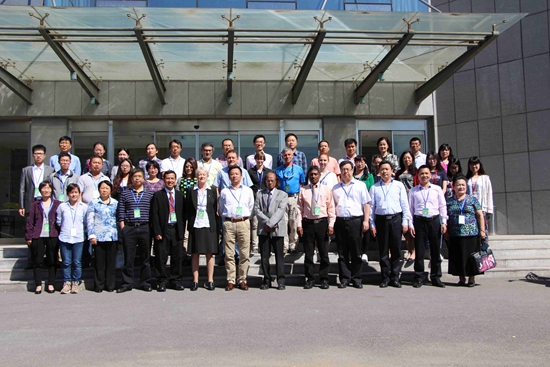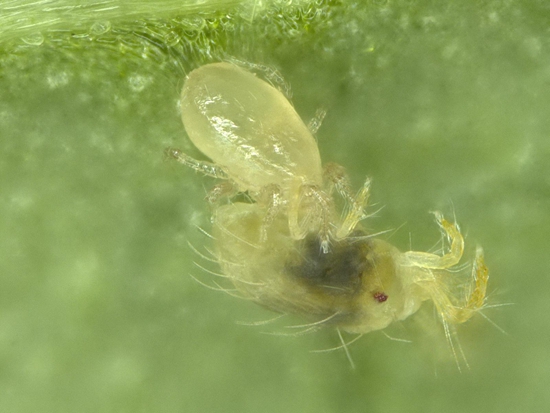分享到
The 1st International Workshop of IOBC-APRS Predatory Mites as Biological Control Agents Working Group successfully held in Beijing
The 1st International Workshop of IOBC-APRS (International Organisation of Biological Control, Asia and Pacific Regional Section) Predatory Mites as Biological Control Agents Working Group was successfully held in Beijing on 15-19 May 2016. This workshop was co-sponsored by IOBC, Institute of Plant Protection, Chinese Academy of Agricultural Sciences (IPP-CAAS), State Key Laboratory for Biology of Plant Diseases and Insect Pests, Chinese Society of Plant Protection, and Beijing Leafy Vegetables Innovation Team of Modern Agro-Industry Technology Research System.
Established in November 2014, IOBC-APRS Predatory Mites as Biological Control Agents Working Group is the working group of IOBC-APRS and the first one convened by Chinese scientists in IOBC. The convenor of this working group is Dr. Xuenong Xu(Professor of IPP-CAAS). The theme of the workshop is “Resources to Industry: bridge the gap”, which implies the interest and endeavor of scientists in screening predatory mite resources and developing an industry with more commercial products against more target pests. More than 50 scientists from New Zealand, Japan, Turkey, Israel, India, Belgium, Poland, Canada, and China participated in this workshop; scientists from Vietnam, UK, Korea, and India contributed to the workshop through sending video presentation, poster, and abstracts.
A total of 32 abstracts were received for this workshop. During the three-day workshop, scientists exchanged ideas on current situation and predatory mite research latest development. Dr. Barbara Barratt (President of IOBC-Global) presented the general information of IOBC Global and the Asia Pacific Regional Section. Dr. Dewen Qiu (Vice Direct of IPP-CAAS) provided a brief introduction of IPP-CAAS. Dr. Xuenong Xu provided a thorough review of predatory mite research and applications in China in the past 50 years, especially focused on the rapid development of this field in the last decade. Other presentations focused on topics including predatory mite resource survey and evaluation, morphological and ultra-structures, host plant-prey-predatory mite interactions, prey-predatory mite-entomopathogenic fungus interactions, hunting behavior, field evaluation and applications, mass production and other aspects. These splendid presentations led to heated discussions.
Four scientists younger than 35 years old were awarded the prizes for their excellence performance in the young scientist oral presentation competition. They are Dr. Yaying Li (Southwest University, China), Dr. Magdalena Felska (Wroc?aw University of Environmental and Life Sciences), Ms. Nathalie Brenard (University of Antwerp, Belgium), and Dr. Jiale Lv (IPP-CAAS, China). Participants also visited the Noah Organic Farm to see the applications of predatory mites and other natural enemies in greenhouse vegetables.
At the end of the workshop, members of the working group reached the decision of holding the workshop once every two years. India won the ballot for hosting the 2nd workshop in 2018. President Barbara Barratt spoke highly of the workshop and predatory mite research in China. She thinks Chinese scientists lead in many aspects of predatory mite research internationally. The workshop also effectively promoted communications and cooperation of predatory mite researchers in the Asia-Pacific region, and enhanced the international impact of Lab of Predatory Mites, IPP-CAAS.
Established in November 2014, IOBC-APRS Predatory Mites as Biological Control Agents Working Group is the working group of IOBC-APRS and the first one convened by Chinese scientists in IOBC. The convenor of this working group is Dr. Xuenong Xu(Professor of IPP-CAAS). The theme of the workshop is “Resources to Industry: bridge the gap”, which implies the interest and endeavor of scientists in screening predatory mite resources and developing an industry with more commercial products against more target pests. More than 50 scientists from New Zealand, Japan, Turkey, Israel, India, Belgium, Poland, Canada, and China participated in this workshop; scientists from Vietnam, UK, Korea, and India contributed to the workshop through sending video presentation, poster, and abstracts.
A total of 32 abstracts were received for this workshop. During the three-day workshop, scientists exchanged ideas on current situation and predatory mite research latest development. Dr. Barbara Barratt (President of IOBC-Global) presented the general information of IOBC Global and the Asia Pacific Regional Section. Dr. Dewen Qiu (Vice Direct of IPP-CAAS) provided a brief introduction of IPP-CAAS. Dr. Xuenong Xu provided a thorough review of predatory mite research and applications in China in the past 50 years, especially focused on the rapid development of this field in the last decade. Other presentations focused on topics including predatory mite resource survey and evaluation, morphological and ultra-structures, host plant-prey-predatory mite interactions, prey-predatory mite-entomopathogenic fungus interactions, hunting behavior, field evaluation and applications, mass production and other aspects. These splendid presentations led to heated discussions.
Four scientists younger than 35 years old were awarded the prizes for their excellence performance in the young scientist oral presentation competition. They are Dr. Yaying Li (Southwest University, China), Dr. Magdalena Felska (Wroc?aw University of Environmental and Life Sciences), Ms. Nathalie Brenard (University of Antwerp, Belgium), and Dr. Jiale Lv (IPP-CAAS, China). Participants also visited the Noah Organic Farm to see the applications of predatory mites and other natural enemies in greenhouse vegetables.
At the end of the workshop, members of the working group reached the decision of holding the workshop once every two years. India won the ballot for hosting the 2nd workshop in 2018. President Barbara Barratt spoke highly of the workshop and predatory mite research in China. She thinks Chinese scientists lead in many aspects of predatory mite research internationally. The workshop also effectively promoted communications and cooperation of predatory mite researchers in the Asia-Pacific region, and enhanced the international impact of Lab of Predatory Mites, IPP-CAAS.


By Xuenong Xu
xnxu@ippcaas.cn
xnxu@ippcaas.cn
Latest News
-
 Apr 18, 2024Opening Ceremony of the Training Workshop on Wheat Head Scab Resistance Breeding and Pest Control in Africa Held in CAAS
Apr 18, 2024Opening Ceremony of the Training Workshop on Wheat Head Scab Resistance Breeding and Pest Control in Africa Held in CAAS -
 Apr 03, 2024IPPCAAS Co-organized the Training Workshop on Management and Application of Biopesticides in Nepal
Apr 03, 2024IPPCAAS Co-organized the Training Workshop on Management and Application of Biopesticides in Nepal -
 Mar 28, 2024Delegation from the School of Agriculture and Food Science of University College Dublin, Ireland Visit to IAS, CAAS
Mar 28, 2024Delegation from the School of Agriculture and Food Science of University College Dublin, Ireland Visit to IAS, CAAS -
 Mar 25, 2024Director of World Food Prize Foundation visited GSCAAS
Mar 25, 2024Director of World Food Prize Foundation visited GSCAAS -
 Mar 20, 2024Institute of Crop Sciences (ICS) and Syngenta Group Global Seeds Advance Collaborative Research in the Seed Industry
Mar 20, 2024Institute of Crop Sciences (ICS) and Syngenta Group Global Seeds Advance Collaborative Research in the Seed Industry
